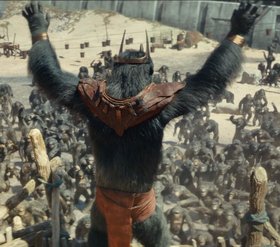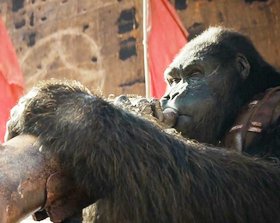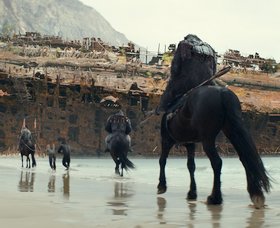Kingdom of the Planet of the Apes
 for intense sequences of sci-fi violence/action.
for intense sequences of sci-fi violence/action.
Reviewed by: Aiden Sexton
CONTRIBUTOR
| Moral Rating: | Better than Average |
| Moviemaking Quality: |
|
| Primary Audience: | Adults Young-Adults Teens |
| Genre: | Sci-Fi Action IMAX Sequel |
| Length: | 2 hr. 25 min. |
| Year of Release: | 2024 |
| USA Release: |
May 10, 2024 (wide release) DVD: August 27, 2024 |




Earth ruled by apes

Slavery / enslavement of the weak by the powerful

Human and ape relationships

Primary themes of The Planet of the Apes series: • Race • Evolution • Questions of animal rights and human treatment of animals
Does the DNA similarity between chimps and humans prove a common ancestry? Answer
It is said that our DNA structures are 97% similar to that of a chimps. Are we only highly evolved apes?
Who’s who and what’s what in the world of “missing” links?
Are the “missing links” really missing, or have they truly been found and documented over the previous century?
Is there fossil evidence of “missing links” between humans and apes? Did humans live millions of years ago? —a detailed and eye-opening report from paleontologist Dr. Marvin Lubenow




| Featuring |
|---|
|
Owen Teague … Noa, a young chimpanzee Freya Allan … Mae / Nova Kevin Durand … Proximus Caesar, a chimpanzee William H. Macy … Trevathan Peter Macon … Raka, an orangutan Lydia Peckham … Soona, a chimpanzee Travis Jeffery … Anaya, a chimpanzee See all » |
| Director |
|
Wes Ball |
| Producer |
|
Wes Ball Peter Chernin See all » |
| Distributor |
“Kingdom of the Planet of the Apes,” one of the first summer movies to come out in 2024, is the culmination of a modern franchise reboot that has been going on for the last thirteen years. Of all the “Apes” movies made over the years, this is the tenth in fifty-six years.
I was introduced to these movies late, watching “Rise of the Planet of the Apes” in 2017 long after its initial release. I loved it, and then promptly watched “Dawn of the Planet of the Apes” and “War for the Planet of the Apes” (the latter in theaters) to experience more from this world. It was only recently in preparation for this review that I saw the original 1968 “Planet of the Apes” starring Charlton Heston, and it’s currently my favorite “Apes” movie that I’ve seen. I still think that this is one of the strongest and most consistent film franchises continuing into the twenty-first century.
Naturally, I was very excited for “Kingdom…” to come out, but I came into the theater slightly dampening my expectations, just in case. I did that with the previous three films because it always seemed unlikely that each one could deliver on its promises. The first three films exceeded my expectations, and so I came into “Kingdom…” excited and hopeful, but also wary and cautious.
I’ll tell you right up front that stepping out of the theater my thoughts toward the movie were mixed-positive, although they have shifted more towards the positive side of the scale now that I’ve had time to mull it over. I’ll explain why below. I’ll do my very best to avoid spoilers, so at times I may need to be vague about certain issues. However, since this movie builds on the previous three films, there may very well be spoilers for those films in this review. I can’t guarantee anything about spoilers for the original “apes” movies, as I have not yet seen all of them.
The Story
The main plot of “Kingdom…” begins 300 years after the death of Caesar, recounted in “War of the Planet of the Apes.” The apes are the dominant species on Earth with numerous different clans. Koro leads one of these clans, and his son Noa (Owen Teague) is the ape we follow throughout the film. Noa discovers members of a different ape clan led by Proximus Caesar (Kevin Durand). These apes claim to hold to the teachings of Caesar, but in a twisted way that is not faithful to what Caesar originally taught (this is something Noa discovers later).
These apes torch Noa’s village and kill many apes living there. Noa fights one of these apes on a tower, falls off, and then wakes up among the ashes of what was once his home. Seeing that everyone was taken captive, he starts on a horseback journey to find his family and vows to bring them back to their rightful home. And that’s all I’ll say about the plot, as revealing anything else will get into spoiler territory.
The Good
There is much to like about this movie. For starters, KINGDOM’s aesthetics are flawless, and the VFX (visual effects) are the most impressive in the entire franchise. This may very well be the “Apes” movie that takes home the Oscar for visual effects come awards season. The scenery, ranging from lush tropical jungles to rugged cliff-girdled beaches, is dazzling to see (especially on IMAX), easily establishing the sheer scope and scale of “Kingdom…” as the biggest of all the “Apes” movies. The VFX for the apes is very convincing and impressive. Compared to the prior films, this movie had the biggest shoes to fill in this regard, as the apes are more anthropomorphic here than they have ever been.
Not a single frame of “Kingdom…” falls flat. Along with a layered sound design, this makes for a truly immersive experience that’s easy to get lost in. The budget is on par with the last two “Apes” films, and from the first shot to the last it’s obvious that they squeezed onto the screen every nickel’s worth.
I enjoyed the diversity of characters in this film as well. The main ape that we follow, Noa, is interesting and relatable because of the purpose and motivation he has in the film. Raka (Peter Macon), the orangutan in the movie, works well as the comic relief sidekick and mentor. He easily could have come off as annoying or throwaway, but I thought he is a nice (and even essential) addition.
There are several other apes we are introduced to in “Kingdom…,” and for the time they were in it, I thought their personalities were fleshed out well. The main antagonistic ape in the movie, Proximus Caesar (literally meaning “closest to Caesar”), is well developed as well, in terms of how formidable and determined he is to accomplish his grand schemes. I was worried at the beginning that I would be confused between the different apes, but it didn’t end up being a problem.
As for the main human character, all I’ll say is that she is perfect in her role, and I liked how unconventional she is.
For those who have been invested in the previous three films in the saga, “Kingdom…” expands on the lore that those films have been building. A lot has happened in the 300 years that lie between “Kingdom…” and “War…,” and I loved how this movie teases at some of the events contained within that time in an intriguing way that makes this world feel real. I was captivated by the (mostly veiled) backstory that led up to the beginning of “Kingdom…” which most of the characters in this movie only know slices.
Lastly, I was intrigued by the story itself. Yes, there are elements of the premise and execution that I had seen before, and I saw several plot points coming a bit before they appeared. However, the important thing is that I ultimately wanted to know how things would turn out. I cared enough about the characters to be interested in their journey, and I hoped that they would get there.
Of course, no movie is perfect (except for “12 Angry Men” and “Casablanca,” but I digress). While I do believe that the good outweighs the bad here, I would be remiss if I didn’t talk about the latter.
The Bad
The single biggest issue can be summed up in one word: clarity. “Kingdom…” has a lot of things that happen and that are brought up, and I wish this movie had done a better job of giving everything to us in a slightly more straightforward way. There are parts in the story where it becomes difficult to remember what the characters’ goals are or what is at stake in the moment. While the pacing of the movie is not inherently slow, I constantly found myself asking how the part of the story I was watching at that moment fit into the larger narrative. All the individual scenes themselves are fine, but for me, the movie as a cohesive whole felt murky and foggy in some places.
Now, I will add a caveat to this issue. While this frustrated me a good bit, this may be a “first-viewing” problem. As of now, I have only seen “Kingdom…” once, but a second viewing may very well help me understand everything better, so that I’m able to fit together the pieces a bit neater. Of course, that’s no excuse for why this film makes sense the way that it does. It would not have been too difficult for the writers to organize things a bit differently to add clarity and the information conveyed within it.
This leads to my second biggest problem, and it is something I (and many others, I’m sure) were worried about. I was concerned that the story of “Kingdom…” would not be as watchable without Caesar, who died in the last movie and was certainly the most interesting part of the trilogy. The characters that we’re supposed to care about in this film are relatable and interesting, and while I did care about them, I don’t think they reached the bar that was set by Caesar in the first three movies. As a result, this film has significantly less emotional impact than its predecessors.
My issues with the film’s quality pretty much end there, but these two things alone are big hits against KINGDOM’s overall quality, and they kept the movie from being so much greater than it could have been.
Content of concern
I was very happy with how little negative content there is in “Kingdom….” It’s easily the most family-friendly of the “apes” movies, though the violence alone makes it unsuitable for most children under 12.
It’s difficult to list everything that might go into the violence category without spoilers, but I will do my best to be vague.
VIOLENCE: Moderate to heavy. Apes ride around on horseback using electric weapons to shock and kill apes on the ground. An ape walks into a forest to find a dozen or so apes dead, as well as their horses. There are chase sequences in many different settings, all of them intense and fast-paced. There are many one-on-one fight sequences between apes. These fights have pummeling, choking, drowning, and electric shocking in them.
A human strangles another human to death on the ground and then throws the body into the water. A human shoots an ape. The ape dies, and blood squirts out of his chest. An ape falls off a cliff to his death. One ape chokes out another ape. An ape falls into a fast and dangerous river. An ape drowns slowly when he becomes wedged into a spot as the water level rises. An ape beats up another ape who spits up blood. Birds attack an ape aggressively. There are a few scenes of intense peril, most of them involving falling.
The violence in “Kingdom…” is by a long shot the biggest issue when it comes to content, and, though I wouldn’t say it has the most violent parts of the “Apes” movies, it might have the highest quantity of violence compared to the others.
LANGUAGE: Mild. “Sh*t” is said three times, and, without spoiling anything, two of these instances are meant very humorously and naively. Besides this, there are a few mild instances of name-calling. Other words used include “stinking human,” “slow-witted,” “scavengers,” and “duplicitous creature.” I noticed no misuse of God’s names.
NUDITY: Minor. When it comes to humans in this movie, there are many different clothing combinations. The most we see in all of those are bare shoulders, slight cleavage, small midriffs, small tears on pants, and bare legs of women. From the men, we see shirtless chests and bare legs. But for the most part, the humans are running very quickly, and so it is difficult to see even these aspects.
SEX: None.
DRUGS/ALCOHOL: None.
OCCULT: None.
WOKEISM: None.
Positive Spiritual Elements
Several positive themes I gleaned from “Kingdom…” helped give the film a deeper and more thought-provoking meaning than it otherwise would have had.
This is where it gets a bit difficult though. For one, I’m not an expert on all the lore that is a part of the “Apes” franchise, partly because I have not seen all the films and am not well versed with the ones I have seen. Additionally, it’s difficult to talk about these ideas in a way that does not spoil “Kingdom…,” as well as the other “Apes” movies that tie into this (and since I have not seen all the movies, I don’t know whether or not I would be spoiling things for those movies). So if these themes come across as vague or surface-level, remember that this is where I’m coming from.
One of the most prominent and thought-provoking themes in “Kingdom…” concerns the handing down of the law. In “Dawn…” and “War…” we see Caesar giving the law to the apes, the three main laws being “Ape not kill ape,” “Knowledge is power,” and “Apes together strong.” These are all consistent with biblical values.
“You shall not murder.” —Exodus 20:13
“A wise man is full of strength, and a man of knowledge enhances his might.” —Proverbs 24:5
“Two are better than one, because they have a good reward for their toil. For if they fall, one will lift up his fellow. But woe to him who is alone when he falls and has not another to lift him up! Again, if two lie together, they keep warm, but how can one keep warm alone? And though a man might prevail against one who is alone, two will withstand him—a threefold cord is not quickly broken.” —Ecclesiastes 4:9-12
Caesar taught a law of morality and mercy to his contemporary apes, and they were meant to pass this law to their descendants so that apes would continue to be strong.
However, this law becomes misinterpreted and lost as hundreds of years pass so what was once known about Caesar and his law becomes not much more than myth. As a result, many try to make a law of their own, based on what is right in their own eyes rather than what is in Caesar’s law that was handed down from their ancestors. Many of the evil apes in this film do things in the name of Caesar, but their beliefs are so far removed from his original teachings that there is no similarity.
This concept is surprisingly relatable today. The founding fathers of America wrote the constitution that our nation was built upon just over two hundred years ago, and today we are still debating and interpreting what they meant when they first penned the words. This country was indisputably built upon Christian values, even though anyone today looking at the current state of America would find that difficult to believe. In biblical times this was also relevant, as there was constant debate over the correct interpretation of certain laws and prophecies written hundreds or even thousands of years prior.
“But some men came down from Judea and were teaching the brothers, ‘Unless you are circumcised according to the custom of Moses, you cannot be saved.’ And after Paul and Barnabas had no small dissension and debate with them, Paul and Barnabas and some of the others were appointed to go up to Jerusalem to the apostles and the elders about this question.” —Acts 15:1-2
“Now these Jews were more noble than those in Thessalonica; they received the word with all eagerness, examining the Scriptures daily to see if these things were so.” —Acts 17:11
This leads to another theme found in “Kingdom…” about objective morality, and the one true law compared with false laws. At one point a troubled Noa ponders a law decreed by a king ape. In a powerful moment, Noa says, “Apes hunt humans. That is the law, but the law is wrong!” He concludes that it is not always right to obey any given law just because it is enforced in a “might makes right” kind of way. The law is based on moral, unchangeable values that are acknowledged, not ordained, by those who are meant to follow it. This idea is confirmed by teachings in the Bible:
“For when Gentiles, who do not have the law, by nature do what the law requires, they are a law to themselves, even though they do not have the law. They show that the work of the law is written on their hearts, while their conscience also bears witness, and their conflicting thoughts accuse or even excuse them.” —Romans 2:14-15
Scripture clearly instructs us to preserve the law of God that has been given to us, passing it down to our descendants. Caesar’s law is comparable to the law of God that, when passed along accurately and followed faithfully throughout the generations, will ensure peace and unity.
“And these words that I command you today shall be on your heart. You shall teach them diligently to your children, and shall talk of them when you sit in your house, and when you walk by the way, and when you lie down, and when you rise.” —Deuteronomy 6:6-7
“He established a testimony in Jacob and appointed a law in Israel, which he commanded our fathers to teach to their children, that the next generation might know them, the children yet unborn, and arise and tell them to their children, so that they should set their hope in God and not forget the works of God, but keep his commandments.” —Psalm 78:5-7
Scripture also warns against those who would do away with objective truth given to us by the Lord and create laws that teach contrary commands. The Bible is clear that the consequences of this are severe.
“For the time is coming when people will not endure sound teaching, but having itching ears they will accumulate for themselves teachers to suit their own passions, and will turn away from listening to the truth and wander off into myths.” —2 Timothy 4:3-4
“My people are destroyed for lack of knowledge; because you have rejected knowledge, I reject you from being a priest to me. And since you have forgotten the law of your God, I also will forget your children.” —Hosea 4:6
He answered them, “And why do you break the commandment of God for the sake of your tradition? For God commanded, ‘Honor your father and your mother,’ and, ‘Whoever reviles father or mother must surely die.’ But you say, ‘If anyone tells his father or his mother, ‘What you would have gained from me is given to God,’ he need not honor his father. So for the sake of your tradition you have made void the word of God.” —Matthew 15:3-6
Also sprinkled throughout “Kingdom…” is the theme of mercy, one of Caesar’s key tenets. At one point two apes see a human at night who is very cold. One ape is reluctant to give the human a blanket that they have in their bag, saying, “No, no, no. This is… important.” The other ape disagrees, saying, “They [humans] get…cold. Show mercy.” Eventually, they end up giving the blanket to the human, even though she never did anything for them. Later this same ape says, “To survive, remember your strength, your compassion, your mercy.”
Scripture has much to say about the showing of mercy and compassion to others (especially the poor) in light of the underserved favor that we as Christians have received from God:
“Blessed are the merciful, for they shall receive mercy.” —Matthew 5:7
“Be merciful, even as your Father is merciful.” —Luke 6:36
“Be kind to one another, tenderhearted, forgiving one another, as God in Christ forgave you.” —Ephesians 4:32
“Whoever is generous to the poor lends to the Lord, and he will repay him for his deed.” —Proverbs 19:17
On a different note, another theme brought up in “Kingdom…” is one about Evolution. I put this in the positive spiritual elements section because it is brought up and defended by the clear antagonist in the movie. Also, it doesn’t tie into the movie the way you would expect it to. More than anything it’s about if/how apes and humans can get along together on the Earth.
At one point, Proximus Caesar says to the main characters (and, consequently, to us),
“Are you familiar with the concept of evolution? In their time, humans were capable of many great things. They could fly, like eagles fly. They could speak across oceans. But now, it is our time… and it is my kingdom. We will learn. Apes will learn. I will learn. And I… will conquer.”
Proximus Caesar is referring to how humans used to be the technologically dominant species on the earth. Proximus’s law includes what he believes to be this necessary doctrine of the apes taking dominion over Earth, following the Evolutionary process as he understands it. He believes that the apes will take full dominion over the Earth and that humans will be subjugated as the “stinky” “scavengers” they are.
This idea of human de-evolution and ape evolution is antithetical to many Bible passages that teach that God gave planet Earth to man for him to take dominion over all of creation (including the apes), not the other way around.
“Then God said, “Let us make man in our image, after our likeness. And let them have dominion over the fish of the sea and over the birds of the heavens and over the livestock and over all the earth and over every creeping thing that creeps on the earth.” —Genesis 1:26
“And God blessed them. And God said to them, “Be fruitful and multiply and fill the earth and subdue it, and have dominion over the fish of the sea and over the birds of the heavens and over every living thing that moves on the earth.” —Genesis 1:28
“You have given him dominion over the works of your hands; you have put all things under his feet, all sheep and oxen, and also the beasts of the field, the birds of the heavens, and the fish of the sea, whatever passes along the paths of the seas.” —Psalm 8:6-8
“The heavens are the Lord’s heavens, but the earth he has given to the children of man.” —Psalm 115:16
According to director Wes Ball, the main question in this movie is, “Can humans and apes live together?” While the movie technically answers this, it’s not in the way one might expect. The ending (which I quite liked and won’t spoil here) points to a sequel that will answer this question more fully and clearly, and in a way that demonstrates the only consistent way that the Earth and its inhabitants can function.
Negative Spiritual Elements
The theme of Evolution that pops up now and again throughout the film. The movie makes it clear that these ideas are inherent to the oppressive, evil monarch who recites them, but the ideas brought forth surrounding it might be confusing to young viewers who are unsure what the movie is pushing for in this regard.
Final Thoughts
Overall, I think this is a worthy sequel to the “Apes” franchise. It continues the long-running story of Caesar and his influence on the ape species throughout the years and adds to the “Apes” lore in an authentic and satisfying way.
I was disappointed in a few areas, but there was a lot to love. As of now, I have only seen “Kingdom…” once, but I suspect that on a second viewing, where all expectations will be evaporated and the journey of the movie will be known beforehand, some of the cons I listed earlier might diminish in light of what is otherwise a very good film. Just having slept on the film for a couple of nights, I already like the film much more than I did leaving the theater. My advice would be to tone down your expectations before seeing it. If you do, you’ll probably like it.
I was pleasantly surprised by the philosophical elements sprinkled throughout this movie which gave me much food for thought. I would encourage Christian parents to talk with their children about these themes, as they are good fodder for conversations regarding morality, laws, tradition, power, interpretation, and ultimate truth.
I would recommend this film to Christians in light of its overall quality, moral implications, and content. But I do this with a couple of cautions. The violence in the film is both heavy and persistent and should be watched only by children who are mature enough. I would also be careful of a few of the evolutionary elements that are mentioned throughout the film that could be confusing for some viewers.
- Violence: Heavy
- Vulgar/Crude language: Mild
- Nudity: Minor
- Profane language: None
- Sex: None
- Drugs/Alcohol: None
- Occult: None
- Wokeism: None
See list of Relevant Issues—questions-and-answers.


PLEASE share your observations and insights to be posted here.


 Answers about Racism, Ethnicity Issues and Christianity
Answers about Racism, Ethnicity Issues and Christianity
Like with the last couple of Apes films, the importance of family adheres biblically.
The violence was more than the others. But maybe we should be grateful for small mercies, that Disney didn’t shoehorn in homosexual apes or an ape insisting on being called they/their…
My Ratings: Moral rating: Average / Moviemaking quality: 3